E.J.Trait: Newspaper Man and Local Activist
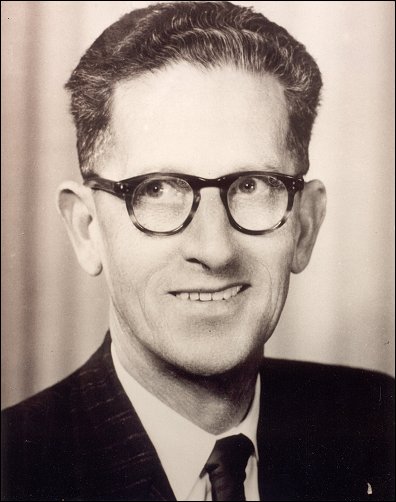
Edward Joseph Trait. Courtesy Mordialloc and District Historical Society.
During the three decades that straddled the middle of last century Eddie Trait of Standard News exerted considerable influence in the municipalities that now make up Kingston and Bayside. His main focus seemed to be the old City of Mordialloc (Mordialloc, Parkdale and Mentone) but his papers were distributed throughout a much wider area. At that time the local paper played a larger part in people’s lives and most people purchased it to learn of the community news, sports results, occasional scandals and what was on at the picture theatres. Advertisements were there as well, but the real estate section was not the dominant part that it is now. When Trait joined Standard News (now part of Leader Newspapers) in 1935 he added his own brand of provocative energy to the local press, making it an element in the community that could not be ignored.
Edward Joseph Trait was born in Geelong in 1897. His family background was almost entirely Irish, although the name Trait seems to be of French derivation with origins in ancient Gallic migrants landing on the Irish coast to escape from their homeland. Trait was heavily influenced by his maternal grandmother and his mother, Johanna (nee Kane). His maternal grandparents came to Australia during the 1850s and knew poverty as they struggled to make a living around the Ballarat diggings where John Kane (his grandfather) worked as a stonemason and cab driver, while Ellen Kane (his grandmother) did domestic work. They prospered through fierce determination so their daughter, Trait’s mother, Johanna, received some education and then trained as a milliner. She moved to Geelong where she worked in one of the big shops and also gained the affections of a young Kyran Trait, the son of another Irish immigrant family. The couple married but Johanna was not a typical housewife of the time. She returned to work in a large Geelong department store after the birth of her two children, a course of action few women pursued in Edwardian times.
Young Edward Trait grew up in Geelong and went to St Agnes’ and then to a small private college before leaving to get a job at a local shipping agent’s business when he was fifteen. During his youth he enjoyed the normal sports and pastimes of boys growing up at that time in a country town. He played sport with his friends and observed the events that made up town life then. Young Edward was particularly taken with theatrical performances, attending Wirth’s Circus when it came to Geelong, and being taken by his mother to various plays and vaudeville shows. He developed a lifelong interest in theatre and music.
Though he settled down at work and learned quickly in his first job, young Trait had a burning desire to improve himself and he regretted not having been able to go further at school. His mother could not afford to keep him as a full time student so Edward went to night school and studied bookkeeping, typing and subjects that allowed him to pass the Commonwealth Public Service Examination with ease. Even then he desperately wanted to make a success of his life and not be considered a failure as some of his relatives were, presumably through excessive drinking. In Eddie Trait’s personality there was a determined resolution that had come from his Irish heritage, particularly through his grandmother, Ellen Kane, who had fought to overcome what she considered were gross injustices done to her race by the English. She passed on to her progeny great strength of character in pursuing causes, and fighting for rights that were perceived to be threatened. Throughout his life Eddie Trait was certainly of this mould.
Trait joined the Commonwealth Public Service in 1916 and remained in the Treasury branch for ten years. By this time Edward’s parents had separated and Johanna moved to Melbourne with her two offspring. Here they enjoyed attending many of the musical comedies and plays in the city, young Eddie revelling in that culture. He did not have the same affection for the public service, seeing the work as mundane and the organisation hopelessly inefficient, with gross overstaffing and downright dishonesty among the employees in their work practices. He left in 1925 and worked as secretary and accountant to Harry Brady, a master builder who had just become his brother-in-law. Trait was not very impressed with the building trades either, claiming that the workers were often exploited, underpaid, and at the mercy of the boss’s whim during the Great Depression when labour was in surplus. But in his job with the building firm he learned a lot about people and how to deal with employees.
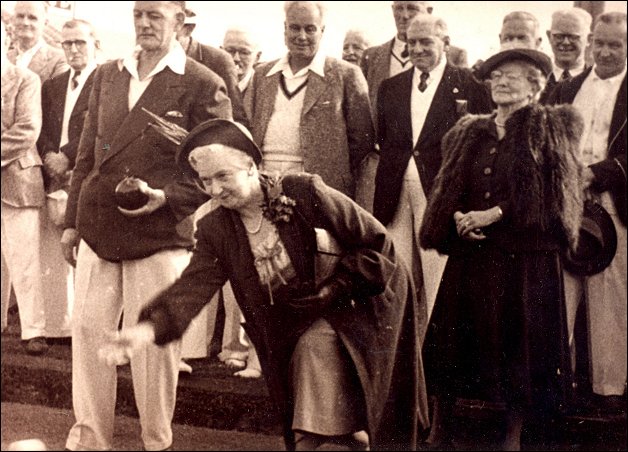
Nan Trait at the opening of the bowling season at the Mentone Bowling Club
Courtesy Mordialloc and District Historical Society, c1960.
In 1925 Edward Trait married Nan Brady, a pretty young woman he had met in the Treasury offices. The young couple bought land and built a home in Milan Street, Mentone, where they spent most of their married life. They had only one child, Ruth, who was born in 1932. The Traits were very proud of their daughter and she was given the advantages of the education that was not so available a generation earlier. Ruth matriculated after studying at Mandeville Hall and did law at Melbourne University. She graduated and joined the Crown Law Department, one of the very few female lawyers employed by government departments at that time. Ruth was also destined to become well known among young folk in the districts covered by Standard News because for many years she wrote the children’s section of the local papers, corresponding with hundreds of youngsters who wrote her letters or entered her competitions. This role absorbed most of her free time at weekends.
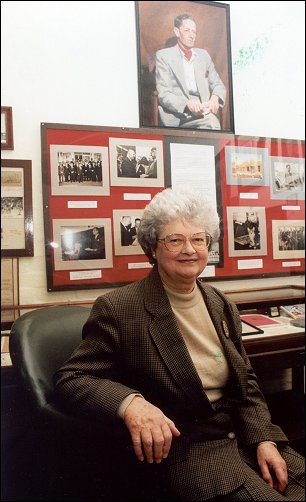
Ruth Trait at the Mordialloc and District Historical Society, 1998. Courtesy the Leader Collection.
Back in the mid-thirties Edward Trait had tired of the building industry and took an opportunity to change direction when he was invited to join Standard News, then a struggling small firm. As an accountant he was expected to make improvements to the firm’s profitability. His appointment from outside the newspaper business was not received enthusiastically by the small staff, so he had to work hard for respect and cooperation. Trait later paid tribute to a small group within the firm who were decent to him right from the start.
Trait’s leadership qualities took him to the position of managing director and editor in 1937. At this time Standard News was rather run down, with old machines, heavy debts and papers that were distinctly old-fashioned in appearance and content. It was a situation that Eddie Trait relished. Here was a challenge. He set to work to make the firm efficient and profitable but he also worked to raise the profile and impact that his newspapers would have in the local district. In 1937 the appearance of the Mordialloc News and the other five papers published from the Standard News Cheltenham offices changed remarkably. The local news content increased. Boring serial stories were no longer there to fill up space. Advertising increased in quantity and attractiveness. There were more photographs, and many of them were almost pin-up shots. Certainly there were many shots of Myrna Loy, Joan Crawford and other film stars which gave life to the notices that particular movies were on at the cinemas of the district. Trait had a flair for capturing the attention of the reader. He began to write hard-hitting editorial comment under the heading ‘Let’s Write a Letter’ in which he expressed forthright opinions on many of the issues of the day. He did not confine himself to local matters. He dealt with the national issues of the time: unemployment, depressed economic activity, the ineptitude of politicians, the unpreparedness for imminent war. When it came to local matters he stirred up some trouble fairly quickly.
In 1937 Trait wrote an article criticising aspects of the Mordialloc Council’s Gas Works policies. He received an immediate call from Council suggesting that it had the right to be consulted about critical comment that was published in local papers. Trait immediately informed the municipal representatives that the editorial policy had changed and no longer would Council or any advertiser in his paper have influence over what the paper printed in editorial comment. The result was an increase in the circulation of Mordialloc News and eventually the other Standard papers.
In the first two years at Standard News Trait worked so hard to turn his company’s fortunes around that his health failed him and he suffered a form of physical collapse which put him in hospital for recuperation over a period of five weeks. He returned with undiminished enthusiasm for building his company and the papers continued to improve in impact and circulation. Trait had an ability to think along unconventional lines in a period when the Depression had dulled most people’s spirits and inventiveness. For instance, when Australia celebrated its 150 years of white settlement in1938 he published a feature where he tried to predict what the Australia of 1988 would be like. In particular he published a forecast of how the local district would develop. He predicted seaplanes taking people to work from bases near Mordialloc and Mentone piers, a wide Nepean Highway, rubberised to reduce noise, large shopping malls and cafes along the beach front, a huge sporting complex in the then undeveloped land near Parkdale Recreation Reserve, and many other wonders. Not much of this has eventuated in the way Trait wrote it but one or two items in his comment at the time have a ring that resonated later. In 1938 the Aboriginal people came together in Sydney for a day of mourning, an early attempt to make white Australians see how dispossessed they had been by European settlement. Rather than condemn this rebelliousness Trait wrote a piece that suggested people should give them credit for having the intelligence to see what had happened to their race and called on people to acknowledge that they had a cause. Though the article is mild in its tone it was not typical of 1930s thinking, showing Trait’s nonconformist tendencies. He also argued that the whole Senate and the House of Representatives should both be elected every three years. In view of the 1975 impasse he had a point.
E.J. Trait was a highly political person. He knew that society was governed by politicians and that if society were to change it could only be done with any immediacy by influencing governments. Trait was a member of the ALP and a founder and chairman of the Mentone branch. However, in his editorial comment he pushed for all party government, claiming that the party system was too petty. In 1940 there was a by-election in Flinders because Jim Fairbairn the sitting UAP member had been killed in an air crash. Trait backed an independent, E.A. Mann (The Watchman of radio fame), and travelled widely to support his campaign. The UAP spent heavily to defeat him, but the result was quite close. He then tried local politics. In 1941 Trait challenged Herbert Edwards for a seat on the Mordialloc Council. There had been some misgivings in the district about the influence that real estate agents had in their positions as councillors and Edwards, a long-established local agent, had been on Council for over twenty years. Trait took up the challenge when Edwards was up for re election. A bitter campaign ensued. There were letters from other estate agents who were outraged that members of their calling could be accused of using Council influence to give advantage to those who dealt in property matters. Trait used the paper to push his cause and Edwards worked through his own channels as a wealthy property owner in the district. The election was close but Trait lost by a small margin. The words of criticism continued to fly, but soon after the election Pearl Harbour and the bombing of Darwin turned minds to more dangerous matters.
During the early stages of the war Trait lambasted the Menzies government for its unimaginative progress towards mobilisation for the growing conflict. When Curtin was made Prime Minister Trait’s papers extolled his virtues, as the editor was a great admirer of the Labor leader. During the war Eddie Trait worked extremely hard for the national cause. Apart from his patriotic writing in the press he was Chairman of the local Red Cross and played his role in the setting up of an emergency air raid disaster centre in Mentone at the City Hall. He chaired meetings of the Mordialloc Citizens’ League which pushed for a hospital to be built, among other post-war reconstruction suggestions.
As time went on Trait became involved in a staggering number of organisations, often being the president. To name some of them, he was actively involved at some stage with these groups: Mentone Life Saving Club, Mentone Bowling Club, Cheltenham Cemeteries Trust, Cheltenham Co Operative Society, Mordialloc Philharmonic Society, Mordialloc Theatre Group, Mentone Progress Association, Frankston – Glenhuntly Cricket Association, St Patrick’s Ball Committee, HACBS (Hibernians), RVIB, Knights of the Southern Cross and Melbourne Suburban Newspapers Association. He was also a Justice of the Peace, a magistrate in the Children’s Court and a patron of other bodies including the Geelong Football Club. Although all of these positions were not concurrent it is still a wonder how he found time for the responsibilities that he assumed.
As the fifties approached Trait continued to produce forthright and provocative newspaper articles and maintain a strong interest in politics. He was also a staunch Catholic and very much an opponent of Communism. He mixed in all circles and had friends of other religious persuasions, but Catholic causes were paramount in his life. His Catholicity did not stop him attending funerals in churches of other denominations, a practice frowned on by the hierarchy of his own church. He was not a bigot, though staunchly loyal to his faith. He organised a large conference of the HACBS in Mentone during 1936, having to negotiate hiring of venues from council officers who were certainly not Catholic. As a leader in the Knights of the Southern Cross he was at the centre of local Catholic thinking. It was to be this loyalty to the Catholic cause that brought about some painful decisions late in E.J.Trait’s life.
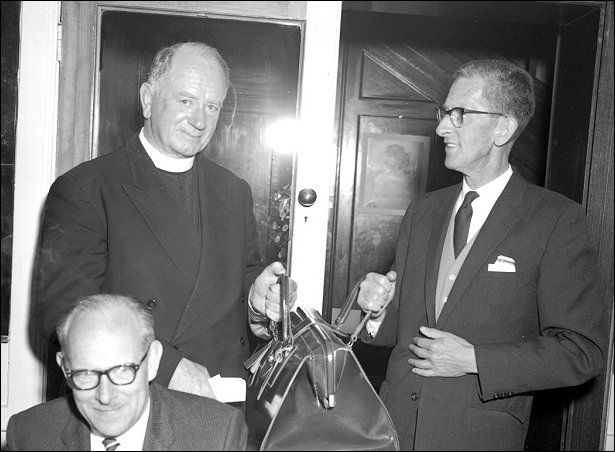
Eddie Trait makes presentation to Father Hartnett, parish priest of Sacred Heart, Sandringham, 1961. Courtesy of Leader Collection.
By 1954 there was trouble brewing in the ALP of which Trait had been an active member. For years there had been claims that Communists had infiltrated the union movement and were a danger to Australia’s security. Opposition to the Communists in the ALP was organised by those known as right wing members, the most notable being B.A. Santamaria who had led a ‘movement’ of industrial groups in trade unions with a view to ousting Communist office bearers. The ALP leadership under Dr Evatt feared these groups as being under the outside influence of the Catholic Church and in 1955 expelled Santamaria’s followers from the party. This anti-Communist group that was now outside the ALP formed another party which became known as the Democratic Labor Party and it fielded candidates at State and Federal elections for many years. It directed its preferences away from the ALP and kept it out of office federally until 1972. At the local level this led to bitterness and the breaking of friendships that had been longstanding. E. J. Trait backed the DLP because it was anti-Communist as did George White the local State ALP member who lost his endorsement and his seat. Many Catholics also went with the DLP and a period of sectarian division ensued. Trait had no hesitation in backing the anti-Communist cause and his papers published editorials supporting the DLP and attacking the ALP for its refusal to fight the ‘reds’ strongly enough. Despite this he did not join the DLP. His papers also published letters and reports about the other parties, but there were accusations that the Standard papers were biased against the original Labor Party.
How all this affected Eddie Trait personally is difficult to say, but it could not have been easy as many of Trait’s former fellow members of the ALP were now numbered among his political adversaries. He probably regretted the religious dissention that resulted because in his earlier work he always seemed to be very fair-minded when it came to matters of religious tolerance. But he also stuck to his guns when fighting a cause and his pursuit of the anti-Communist objective was no different.
Trait continued to write strong articles on many causes for the rest of the fifties and in the early sixties. His last political fight came in 1962 when Jack Grut, the Town Clerk at Mordialloc, was suspended by Council, having incurred the displeasure of the Mayor and several councillors for what they termed inefficient handling of his work. Grut took the Council to court for wrongful dismissal and won his case. Trait fiercely attacked the Council for wasting money on fighting the case and claimed it was the councillors who should resign and not the Town Clerk.

Eddie Trait in his office at Cheltenham with Mr Bitson, c1960. Courtesy Leader Collection.
Despite the fact that Eddie Trait spent a lifetime fighting for those he considered underprivileged, or people whose rights had been forgotten by those in authority, he was also at home with people who were society’s leaders and he was respected by them. He was proud to receive the OBE from the Queen’s representative, Sir Dallas Brooks, in 1958 and he had a high respect for the young monarch. This may seem incongruous in one whose heritage contained some anti-British elements. But Trait was on the side of decency and he saw Elizabeth 2 as a decent influence. It was also Trait’s desire to exert a moral influence that saw his company spend a lot of money on publishing Australian Boy, a wholesome comic paper, to counter the effects of sleazy American comics of the time. He also supported the Mentone Police and Citizens Boys’ Club during the fifties.
E.J.Trait was in Canberra in May 1963 attending a conference of Knights of the Southern Cross when he collapsed and died. A bout of rheumatic fever in his youth had affected his health throughout his life and heart failure was its final legacy. Trait’s death at 65 years was a shock and there was a large funeral beginning at Sacred Heart Sandringham, to which parish the family had moved in 1962. Hundreds of tributes came from people in all walks of life. Prime Minister Menzies sent his condolences, as did the Premier of Victoria, Henry Bolte.
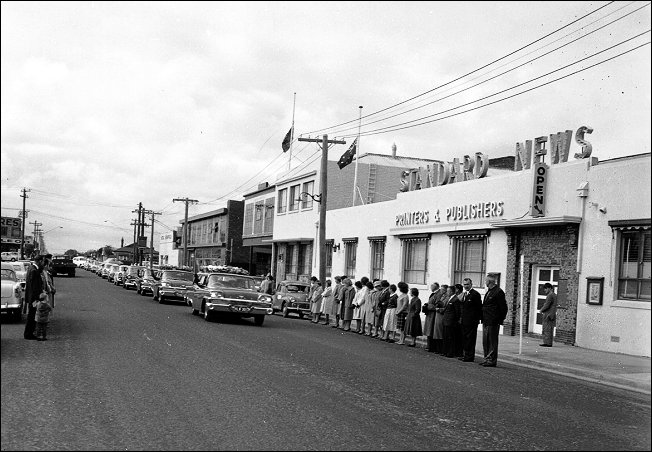
Funeral cortege of E J Trait outside the Standard Newspaper Office, Cheltenham, 1963. Courtesy Leader Collection.
There would be few people of the districts around Mentone and Mordialloc during Trait’s time who were as well known or who were as involved as he was in community life. He lifted the performance of the Standard News until it became very profitable and influential, dwarfing its status of the thirties when Trait took it over. As managing director he was highly regarded in the newspaper publishing business. However, it was the forthright editorial policy and the creative style that Trait fostered in his papers that was his lasting legacy. Each week people were challenged with ideas and opinions. There was no complacency in his attitude to the local and national scene as he saw it. Many people disagreed with his political stance and many of his other policies as well, but they had no doubts about where he stood and they knew he had a cast iron brand of integrity. Above all he had the insight to imagine a better world. As an example, when Mentone Racecourse was threatened with closure in the forties he saw that land as an ideal venue for parklands and playing fields. ‘Another Albert Park’, is what he wrote, hoping that the authorities would reserve it.
What a pity some of Trait’s dreams were not realised over the years.
